GOING SOLO
Page 44

If you've noticed an error in this article please click here to report it so we can fix it.
• The lifeblood of the haulage industry is the enterprise shown by drivers eager to swap their routine role behind the steering wheel for the unfamiliar driving seat running their own business. But the route to going it alone successfully can be pitted with obstacles. We map the way to running solo.
STEP ONE: GETTING THE CPC
If you are a truck driver thinking of setting up on your own the first thing you must do is to acquire the certificate of professional competence needed to prove your ability to run a haulage company to the Licensing Authority. Relevant courses, either residential or home-study, are run by colleges and private companies around the UK with exams held four times a year. The multiple-choice test, which comes in for regular criticism as being merely a memory test with little bearing on the actual hassles of running a firm, is supposed to check your knowledge of the law and business practice. Once you have this piece of paper you can approach the Licensing Authority for your operator's licence.
STEP TWO: THE LICENCE APPLICATION
Unlike many Continental countries, the UK has no quota limits on who can become a haulier. Anyone who meets certain obligations can in theory get a licence. To make an application you must obtain a form from the LA's office (see in the telephone book under Department of Transport). You must then advertise in your local paper within 21 days, informing the public of your intentions. You can use a form supplied. You must also include with your application to the LA, proof that you have enough cash to set up a business (a copy of bank statement or letter from bank manager will do), a copy of a maintenance contract (with a dealer who will do regular services) or proof that you can do your own repairs (you will need your own or access to a garage), details of your proposed operating centre and the vehicles you plan to run. You do not need to own any vehicles yet, but you will need a letter showing permission to park at a premises or title deeds for your own operating yard. The LA will also want a copy of your CPC, the advert and details of any convictions.
Your application starts from the publication of the advertisement and residents have 21 days in which to make representations against your getting a licence. The LA then publishes your application and a further 21 days are given for objections. The LA can then grant the licence or call a public inquiry. He may also send a form GV79E which will explain any environmental conditions under which the operating centre must be run.
STEP THREE: BUYING THE VEHICLE
You now have your operator's licence. Next you must find a vehicle. You can either buy one second-hand through classified pages in trade magazines such as Commercial Motor or in local papers. Or you can do the round of dealers, most of which offer substantial lease-purchase schemes on new vehicles (a feature explaining your statutory rights when buying a vehicle appears on page 56).
STEP FOUR: INSURANCE
You should get your vehicle, property and the goods you plan to carry insured. A guide to insurance appeared in CM 11 May. Brokers specialising in transport advertise in the trade press and the Road Haulage Association also runs its own scheme. It is advisable to approach brokers who deal mainly in haulage and who offer packages covering all aspects of an operation. This means less paperwork and in the long term may be cheaper.
STEP FIVE: ACCOUNTANT AND SOLICITOR
Any business has to have its books audited by an independent assessor once a year. You can find auditors, generally chartered accountants, on most high streets or in the telephone book. It is also advisable to find a solicitor who can help you draw up contracts and make sure they are watertight, and an accountant who can advise you on financial matters. Both should understand transport (you do
not want one who thinks a fifth wheel comes attached to an axle and has a tyre). Employing the services of an accountant and a solicitor may seem like extravagance when it feels tough enough to earn an income sufficient to feed your family, but sound advice pays off in the long run.
STEP SIX: GETTING WORK
You have fulfilled all your legal obligations to become an operator, you have a truck and premises, they are insured, and you have experts in law and money backing you up. Now comes the hardest bit. . . finding work.
Most new operators will have done some groundwork before setting up in business, making contacts, checking what work may be available and deciding in which area of the industry to operate. While general haulage is getting more crowded, certain niche markets continue to prosper. However, pressure on margins is high. Every year, more than twothirds of all new businesses go bust and hauliers figure high among the casualties.
Remember: your local high street bank is invariably the best place to seek advice. Most clearing banks now have small business advisers on hand to help you make key decisions with your money. Trade associations such as the Road Haulage Association and Freight Transport Association also offer a range of services to members, from insurance to vehicle checks. Membership also entitles you to wear the association badge, which can be helpful in obtaining work.
0 by Murdo Morrison


























































































































